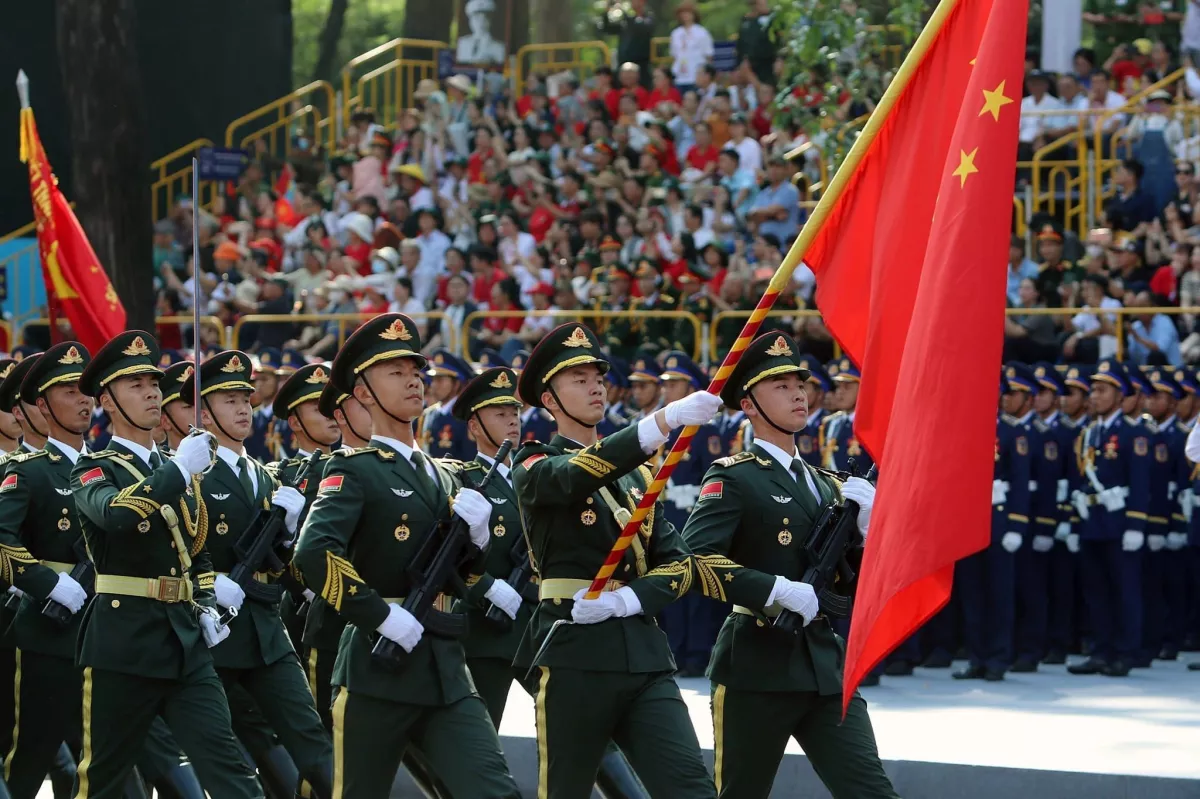As Trump undermines post-war healing in Vietnam, China gains symbolic ground Chinese troops join Vietnamese march in liberation parade
Vietnam’s 50th anniversary celebrations marking national reunification have become the latest stage for the ongoing geopolitical tug-of-war between China and the United States for global influence.
US media reported that President Donald Trump directed officials to skip public celebrations in Ho Chi Minh City, an event that notably featured Chinese troops marching in the military parade for the first time—a highly symbolic gesture. Although Trump later appeared to relax the directive and some US officials were seen at the events, such actions, combined with sweeping cuts to US foreign aid that are sponsoring key programs that address harsh war legacies, have significantly undermined post-war reconciliation efforts.
These moves, argues an article by Times magazine, are eroding Vietnamese trust and diminishing US influence in a region of critical strategic importance to Washington and Beijing alike. On April 30, 1975, North Vietnamese forces captured the Independence Palace in the capital city, that was then known as Saigon, marking the fall of the US-backed South Vietnamese government and the reunification of the two Vietnam under communist rule. Known in Vietnam as the American War, the two-decade-long conflict resulted in the deaths of nearly 60,000 American soldiers and over 3 million Vietnamese.
Although the war left deep scars, both nations have pursued reconciliation, with the US funding projects to address war legacies like environmental damage and unexploded ordnance. However, recent actions by the Trump administration have threatened to undermine this progress.
According to the New York Times, the Trump administration reportedly discouraged US diplomats from participating in Vietnam’s recent 50th anniversary commemoration of the war’s end. While some officials were later seen at events, after he apparently eased his order, initial signals suggested a cooling of symbolic and diplomatic engagement. Notably, communist allies like China, Cuba and Laos attended the celebrations, along with regional neighbours such as Cambodia.

Tim Rieser, who served for 37 years as a foreign policy aide of then-US Senator Patrick Leahy, who was known for leading humanitarian efforts between the US and Vietnam, emphasizes the importance of maintaining strong ties with Vietnam for Washington to be able to counter China's growing influence in Southeast Asia. This year's military parade in Ho Chi Minh City featured Chinese troops for the first time, symbolizing deepening ties between Vietnam and China following President Xi Jinping's recent visit. Despite historical conflicts and ongoing territorial disputes, Vietnam framed China's participation as a celebration of longstanding friendship and support during its independence struggle, which would've only received a significant boost by the visible absence of US officials at this year's parade. The Trump administration’s policies have gone beyond symbolism.
Key reconciliation initiatives, particularly those funded by USAID, have been frozen or disrupted. These include critical programs aimed at cleaning up toxic contamination from the infamous Agent Orange, a herbicide used by US forces during the war. One of the worst-affected sites, Bien Hoa Air Base near Ho Chi Minh City, was undergoing a $450 million decontamination project begun in 2019. Yet in early 2025, workers were told to halt operations amid USAID cuts, leaving pits of dioxin-contaminated soil exposed before funding was partially restored. Other programs have also been affected. USAID-funded disability rehabilitation efforts for Agent Orange victims in 10 provinces were paused, leaving some organizations underfunded and forcing them to lay off staff. Although some funding has resumed, the disruptions have hampered effectiveness.
Similarly, demining operations in provinces like Quang Tri—home to the highest density of unexploded ordnance—were temporarily suspended, costing up to 1,000 jobs. Such unexploded ordnances have killed around 40,000 people and injured 60,000 in Vietnam since 1975. Additionally, a $15 million wartime accounting initiative to identify Vietnamese missing from the war was terminated, reviewed, and only later reinstated by the Trump administration. These inconsistencies have raised concerns about US reliability.
According to Vietnamese researcher Phan Xuan Dung, such actions reinforce the perception in Vietnam that the US is an unreliable partner—even in addressing damage it caused during the war. The article warns that decades of trust-building between the US and Vietnam are vulnerable to reversal. Without consistent commitment, efforts at reconciliation could unravel, weakening US influence in a strategically vital region and diminishing the progress made in healing the wounds of a brutal war.
By Nazrin Sadigova








